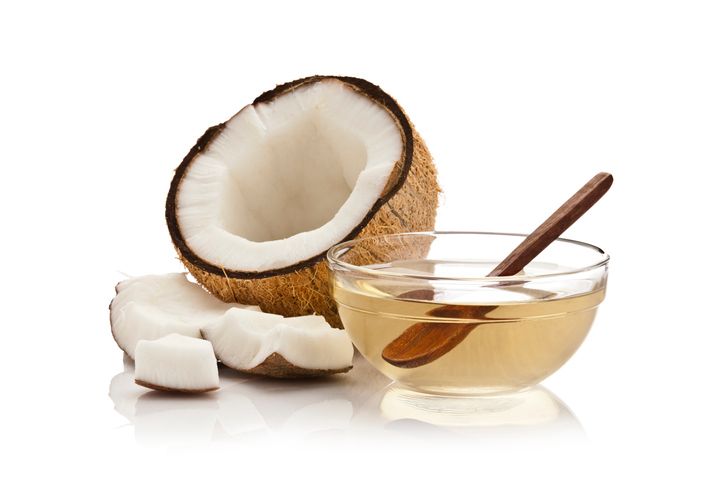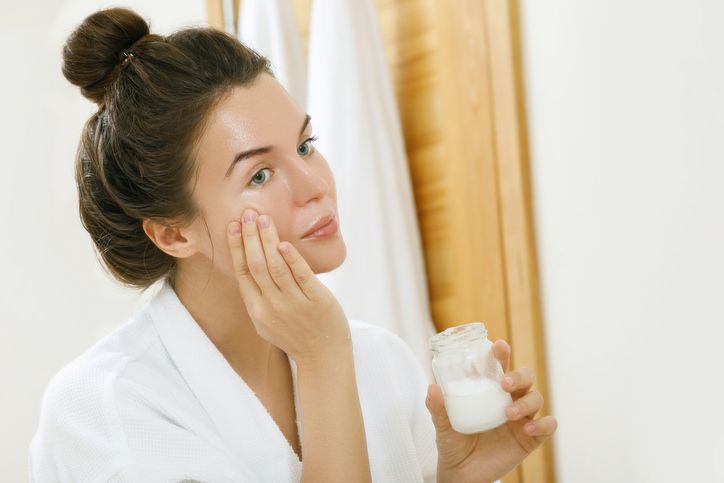
- Home
- Trend
- Weight Loss Strategies
- Acne Tips
- Hair Health Information
- Blemish Removal Tips
- Acne Scar Removal Tips
- Muscle Building Techniques
- Intimate Care Tips
- Postpartum Intimate Care
- Eye Bags Wiki
- Tips for Face Slimming
- Secret of Permanent Hair Removal
- Breast Enlargement Tips
- Cure to Snoring
- Marionette Lines
- Skin-Tightening Secrets
From moisturizing, teeth whitening, and hair care to soothing eczema, coconut oil is considered a holy grail for dry skin! However, dermatologists warn that its skincare benefits may be overrated—and using it on oily or acne-prone skin could clog pores and trigger breakouts. Let's explore the pros, cons, and risks of using coconut oil in your skincare routine.
What Is Coconut Oil?

Coconut oil is extracted from the mature flesh of coconuts, typically using a cold-pressed method. It’s one of the most versatile natural oils in the world, known for its moisturizing, antibacterial, and antioxidant properties. Some even claim it aids in weight loss.
One major trait of coconut oil is its high saturated fat content. If misused—especially on oily or acne-prone skin—it can easily clog pores and lead to widespread folliculitis or acne flare-ups. Those with oily skin should be extra cautious.
Coconut Oil Benefits—Not Just for Skincare!

1. Moisturizing
Coconut oil is rich in Vitamin E and antioxidants, helping to lock in moisture, soften skin, boost elasticity, and reduce the appearance of fine lines. Its molecular structure closely resembles human sebum, making it suitable for skin use. However, due to its oil content, overuse can clog pores—especially for oily skin types.
2. Antibacterial
Coconut oil contains lauric acid—an antibacterial compound rarely found in other oils. Lauric acid is even used in commercial skincare under the name glyceryl laurate. With around 47% lauric acid, coconut oil’s antibacterial power tempts even acne-prone users to give it a shot—but it’s still best suited for dry or mature skin.
3. Antioxidant & Anti-Aging
Rich in antioxidants like Vitamins E and K, coconut oil helps fight free radicals that cause skin aging. While it improves hydration and reduces inflammation, it should never replace sunscreen—it doesn't offer adequate UV protection.
4. Soothing & Anti-Itch
Coconut oil may help with chronic inflammatory skin conditions like mild eczema. It stabilizes free radicals, speeds up skin healing, and boosts immunity, easing itchiness, pain, and inflammation for smoother recovery.
免費體驗
Acne Treatment
1 Minute Self-Registration
Date should not be before minimal date
How to Choose Coconut Oil for Skincare: Grades & Labels
For skincare, teeth whitening, or edible use, choose extra virgin, organic, cold-pressed, non-hydrogenated coconut oil.
Brands that follow fair-trade principles often hand-harvest coconuts without adding chemicals during production. After falling naturally, coconuts are selected, de-husked, and cold-pressed to retain maximum nutrients without additives.
Look for:
• Extra virgin
• Cold-pressed
• Organic
• Non-hydrogenated
• Fair trade–certified
Is Natural Coconut Oil Allergy-Free?
No. Natural doesn't mean hypoallergenic. Many are allergic to natural ingredients like peanuts, wheat, mango, shellfish—and yes, coconut.
Coconut oil has small molecules that penetrate deeply into skin, increasing the risk of irritation. Always patch test on an inconspicuous area before full use, especially if you have sensitive skin. If you're allergy-prone, choose skincare products where coconut oil is a minor ingredient rather than using it pure.
How Celebrities Use Coconut Oil for Full-Body Care
In Hollywood, coconut oil is a staple in many celebrities’ beauty routines. Stars like Angelina Jolie, Emma Stone, and Miranda Kerr, as well as Hong Kong icons Sammi Cheng and Joey Yung, swear by it. So how do models use coconut oil head to toe?
1. Teeth Whitening – Oil Pulling
Swishing coconut oil in the mouth (oil pulling) can reduce bacteria, plaque, bad breath, and possibly whiten teeth. Results vary depending on frequency and consistency.
2. Body Lotion
Below 24°C, coconut oil solidifies. Rub a small amount between your palms to melt it, then massage onto damp skin after showering for better absorption.
3. Makeup Primer
In dry weather or seasonal transitions, use a tiny amount before makeup to hydrate skin. Some models apply coconut oil after washing their face in the morning to reduce flakiness and improve foundation adherence.
4. Makeup Remover
Coconut oil removes even heavy makeup. Massage onto makeup areas to dissolve, then wipe off with warm water or a damp towel. However, oily and acne-prone skin types should avoid using it for makeup removal to prevent clogged pores.
5. Hair Treatment
Use coconut oil as a hair serum to tame frizz, soften ends, and add UV protection. You can also apply it to dry body areas like elbows, heels, or post-sunburned skin for soothing relief.
6. Cooking – Boost Fullness
Some models use coconut oil in cooking (e.g., scrambled eggs, pancakes) to help with satiety, regulate calorie intake, and promote digestion—all of which may indirectly benefit skin by supporting gut health.
7. Nail Care
Use as a cuticle oil to moisturize hands and nails, prevent fungal infections, and treat nail discoloration or hangnails.
8. Lip Balm
Apply directly or mix with sugar for a lip scrub. It hydrates, softens lips, and reduces chapping. However, acne-prone users should avoid applying near the lip line to prevent breakouts.
9. Dietary Supplement
Some stars consume a teaspoon of coconut oil daily for its antioxidant, detox, and gut health benefits. Miranda Kerr stirs it into green tea, while Angelina Jolie eats it plain. Those with digestive issues should consult a doctor before ingesting coconut oil.
免費體驗
Acne Treatment
1 Minute Self-Registration
Date should not be before minimal date
Can Oily/Acne-Prone Skin Use Coconut Oil?
Some beauty influencers use virgin coconut oil for makeup removal and claim it pulls out blackheads after facial massage. While oil dissolves oil and heat expands pores to release gunk, coconut oil doesn’t emulsify—it lacks surfactants. This makes it difficult to rinse off fully, leaving residue that clogs pores and increases the risk of full-body folliculitis.
That doesn’t mean oily skin types must avoid coconut oil entirely. It can be used in small amounts on inflamed acne spots to help them heal and reduce scarring. Avoid large areas or using it for moisturizing or cleansing.
Combo Skin Use:
Apply to dry zones only (e.g., cheeks) in small dabs. For oily T-zones, avoid direct use. You can also use coconut oil to remove eye or lip makeup, or as a lip and body balm.
How to Use Coconut Oil for Skincare
For Oily Skin:
1. Warm a small amount in palms before applying to remove sunscreen or makeup.
2. Gently massage, especially around blackheads—no longer than 2 minutes.
3. Wipe off with a warm towel and follow up with a facial cleanser until no residue remains.
If you notice more clogged pores or breakouts, discontinue use immediately and consider alternative uses for coconut oil.
For Dry Skin:
1. After cleansing or makeup removal, melt coconut oil in palms and apply evenly to face and neck.
2. Place a warm towel over the face until it cools, then rinse gently with warm water.
3. You can skip face wash to let the oil act as a natural moisture barrier.
4. Unless you have extremely dry skin or it’s winter, additional skincare products may not be needed at night.
Coconut oil is greasy and may stick to pillowcases or hair—use sparingly and press gently into skin.
Coconut Oil Skincare Precautions
1. Use separate containers for different purposes (e.g., food, skincare, massage) to avoid contamination. Don’t scoop with fingers.
2. Patch test before applying to face or affected areas.
3. Apply before bedtime to enhance overnight skin repair.
4. Apply on eczema-prone skin after bathing while skin is still damp to lock in moisture.
5. If used near the eyes, apply with a cotton swab to avoid oil entering the eyes.
免費體驗
Acne Treatment
1 Minute Self-Registration
Date should not be before minimal date
TCM Perspective on Coconut Oil
Traditional Chinese Medicine (TCM) regards coconut oil as neutral and nourishing. Most people can use it externally, but those with eczema should proceed carefully.
For mild eczema symptoms like dryness and itching, coconut oil can moisturize, reduce inflammation, and protect skin from bacterial infection—helping prevent scratching and worsening the condition. However, if eczema is severe or involves open wounds, consult a professional before use.
Dermatologists’ View on Coconut Oil Skincare
1. Not Suitable for Sun Protection
Due to its low natural SPF, some fans of natural products apply coconut oil or olive oil on their face as a substitute for sunscreen. However, dermatologists warn against using edible oils for sun protection. Coconut oil only provides an SPF of 4—far below that of commercial sunscreens. Moreover, for effective UV protection, about 2 mg of sunscreen is required per square centimeter of skin. Applying such a large amount of coconut oil on the face is simply impractical.
2. Limited Skincare Benefits
Though coconut oil contains antioxidants like vitamin E and K, the nutritional value varies depending on the grade and brand. Its skincare ingredients don’t compare to those found in professional skincare products. Using only a small amount won’t achieve sufficient concentration to nourish the skin, and the oil’s quality can be inconsistent. Realistically, the main benefit you can expect from coconut oil is moisturization.
3. Strong Smell and Sticky Texture
Coconut oil can leave the skin greasy and uncomfortable if overapplied. Its scent—though lighter than sesame or peanut oil—is still noticeable. Compared to properly formulated skincare products that are fragranced, have optimized textures, and absorb well, coconut oil falls short in terms of user experience. In fact, how a product feels on the skin often plays a bigger role in continued use than its actual efficacy.
4. Doesn’t Wash Off Easily After Makeup Removal
Coconut oil is commonly used for removing makeup. However, dermatologists point out that effective makeup removal requires surfactants. These compounds bind to both oil and water, helping to emulsify and rinse away makeup and dirt. Coconut oil lacks surfactants and doesn’t go through an emulsification process, so while it can break down makeup, the residue left behind can clog pores.
5. Clogs Pores and Causes Breakouts
During the height of the coconut oil skincare trend, many people with oily or acne-prone skin became victims of breakouts. Coconut oil’s small molecules can penetrate deeply into the skin and are hard to wash off, leading to clogged pores. Once bacteria enters or skin gets scratched, widespread folliculitis can occur. Dermatologists emphasize that coconut oil lacks the consistency and quality control of commercial skincare products, making it unsuitable for everyday use.
Can Oily Skin Types Use Other Oils Instead of Coconut Oil?
Coconut oil is one of the most versatile edible oils, largely due to its rare and abundant lauric acid content. But it's far from the only oil used in skincare. Some oil-skincare enthusiasts suggest alternatives like grapeseed oil, argan oil, or jojoba oil. Among them, jojoba oil is generally considered the most suitable for oily skin types.
免費體驗
Acne Treatment
1 Minute Self-Registration
Date should not be before minimal date
Editor with Oily Skin Nearly Got Folliculitis After Using Coconut Oil for Makeup Removal!
During the peak of the coconut oil skincare trend, I jumped on the bandwagon to boost my health and even tried oil pulling—but quit after less than two days. Later, I decided to use coconut oil as a cleansing oil after reading up online. As someone with oily skin looking to improve blackheads through oil-based skincare, I now look back with tears in my eyes.
I used expensive virgin coconut oil to remove makeup and massage away blackheads (though not much came out), followed by hot towel compresses and warm water cleansing. Everything seemed fine—until the next morning, when I felt clogged, raised pores all over my face, especially on the cheeks. The rough, uneven skin texture nearly triggered my trypophobia!
If the clogged pores had become infected, each one could have turned into a pus-filled inflamed bump, leading to full-blown folliculitis and a face full of acne scars. Luckily, I narrowly avoided disaster by switching to a minimalist routine and slowly smoothed my skin out over two weeks. In hindsight, it was pure luck.
Since then, I’ve been traumatized and never dared to massage, cleanse, or moisturize with edible oils again. The lesson? Oily skin simply doesn’t need that much oil!
Oil-Based Skincare Clogs Pores and Causes Acne? Try This for Blackheads Instead!
Coconut oil skincare isn’t for everyone—especially not for sensitive, oily, or acne-prone skin. My personal experience is proof that oil-based skincare can be risky for oily skin. Plant oils may penetrate the skin easily, but washing them off is another matter—what starts as a blackhead treatment could quickly turn into a blackhead outbreak!
To gently and effectively remove blackheads, deeply hydrate the skin, and restore oil-water balance, try the Acne Treatment at Perfect Medical. This treatment uses vacuum microdermabrasion to gently exfoliate 30mm–35mm of dead skin, sebum plugs, and dirt from the skin’s surface. It effectively cleanses deep into the pores and dissolves blackheads.
The dual-channel spiral suction system works by vacuuming out loosened blackheads through one tube while simultaneously infusing hydrating medical-grade essence through another. This boosts skin hydration and rebalances oil production from the root, keeping your face fresh and shine-free.
Whether it's coconut oil or other oils marketed to oily skin, they all carry the risk of clogged pores, breakouts, and folliculitis. To improve your skin, you don’t have to settle for edible oils—there are plenty of professional treatments and skincare products tailored for every skin type. These offer better nutrient density, stability, safety, efficacy, and user experience compared to coconut oil.
For example, the Acne Treatment is specifically designed to clear blackheads and dead skin, restore balance, and resolve acne issues from the root!
Spend just one minute filling out a simple form and receive a FREE trial session including a professional skin analysis and Acne Treatment, PLUS a complimentary whitening and hydrating face mask. It’s time to clear your acne for good!
Free Trial Available: Acne Treatment免費體驗
Acne Treatment
1 Minute Self-Registration
Date should not be before minimal date
FAQ

What are the benefits of coconut oil?
The greatest benefit of coconut oil lies in its ability to hydrate and lock in moisture for the skin. It is rich in saturated fatty acids and has a structure similar to human sebum, with very small molecules that can penetrate deep into the skin to boost hydration and help retain moisture. Another standout feature is its 47% lauric acid content, which has powerful antibacterial properties that can help disinfect the skin and reduce inflammation. In addition, coconut oil contains antioxidants like vitamin E and vitamin K, which can help reduce photoaging and fight early signs of skin aging. It is particularly beneficial for dry, eczema-prone, and aging skin.
How can coconut oil be used for full-body skincare?
Coconut oil has a wide range of uses. It can be applied directly as a body lotion for hydration and moisture retention. It’s also used in oil pulling to whiten teeth and improve oral hygiene. A small amount of coconut oil can serve as a makeup primer, makeup remover, or hair tip treatment. It can even be used in cooking or added to drinks to aid digestion and relieve constipation. Those with mild eczema can also apply it topically to soothe itching and inflammation.
Can oily/acne-prone skin use coconut oil for skincare?
Coconut oil is not suitable for oily or acne-prone skin. These skin types already produce excess sebum, and using oil-based products can easily push oil levels beyond the limit. While coconut oil’s small molecules allow it to penetrate the skin deeply, they are also difficult to wash off completely. This makes it highly likely to clog pores, leading to more blackheads or even triggering folliculitis and acne. If you still wish to use coconut oil, it's best to apply a small amount with a cotton swab only on inflamed pimples or small areas of irritated skin to leverage its antibacterial effects.
What are the downsides or risks of using coconut oil for skincare?
Although coconut oil has many claimed benefits, dermatologists point out that it should not be used as a sunscreen. Its SPF is only around 4, and you'd need to apply a large amount for even minimal protection—making it an impractical sunscreen substitute. In comparison to commercial skincare products, coconut oil is relatively low in efficacy, lacking the concentrated skin nutrients needed for meaningful results. Its main function is moisturizing. Many people use coconut oil as a makeup remover, but proper makeup removers contain surfactants that allow emulsification and thorough cleansing. Coconut oil lacks these surfactants, so while it may dissolve makeup, the residual oil can linger in pores and cause blockages. For these reasons, it's not recommended for oily or acne-prone skin. In terms of effectiveness, stability, safety, quality control, and risk management, purpose-made skincare products are far superior to coconut oil.
What aesthetic treatment is suitable for acne-prone skin?
Tempted by the idea of dissolving blackheads and deeply hydrating your skin with oils? It might be time to shatter the “oil-based skincare” dream for oily and acne-prone skin! These skin types simply don’t need—and can’t tolerate—excess oils. Coconut oil's small molecules easily clog pores and can trigger folliculitis and acne outbreaks. To improve acne-prone skin, it's not about adding more but taking away. Perfect Medical’s Acne Treatment uses vacuum microdermabrasion technology to gently exfoliate 30mm–35mm of dead skin cells, oil plugs, and dirt from the skin’s surface. This treatment also employs dual-spiral vacuum suction: one tube extracts blackheads and impurities, while the other infuses deep layers of skin with medical-grade moisturizing essence to hydrate and balance oil production. With its dual cleansing and hydration effects, the treatment effectively clears blackheads, acne, and clogged pores, reducing oil at the root and giving your skin a true fresh start.








